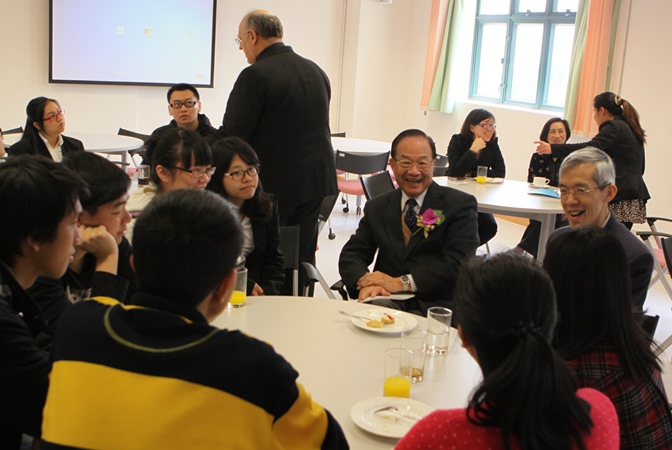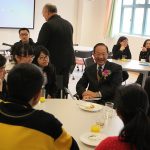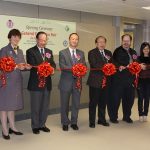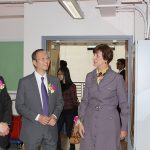
To help staff and students gain a better understanding of its innovative new General Education Programme the University of Macau (UM) yesterday (26 March) launched a 5-day General Education Fair, the first of its kind in Macao. The general education programme has been designed to create a common core curriculum for all students to ensure that they all have an equal chance to develop the knowledge, skills and attitudes they will need to pursue more satisfying careers and live happier, healthier and more balanced lives. Director of the Tertiary Education Services Office of Macao SAR Sou Chio Fai, UM's University Council Chair Dr. Tse Chi Wai, UM Rector Wei Zhao, Director of UM's Centre for Teaching and Learning Enhancement (CTLE) Prof. Rik Carl D'Amato, Coordinator of Mentoring and Professional Development of CTLE Prof. Gertina Johanna Van Schalkwyk, along with other guests, officiated at the opening ceremony, and visited the newly-launched smart classrooms afterwards. The General Education Fair includes a general education competition, demonstrations on how to use the smart classrooms, exhibitions, booth games, workshops and lectures. UM Rector Wei Zhao said that in order to produce outstanding graduates with integrity, cross-disciplinary knowledge, critical thinking, problem-solving skills, and creativity, UM implements a "4-in-1" pedagogical model that consists of discipline-specific education, general education, research and internship education, and community and peer education (through residential colleges). He said UM hopes that through general education, students can enhance problem-solving ability and better deal with competition and various challenges in the future. Director of the Tertiary Education Services Office Sou Chio Fai said: "In the current fast-changing world, education does not and cannot mean the passing on of knowledge alone. What is relevant or useful today may not meet future demands. Students need the ability to keep pace with the changing environment and respond to trends in learning. Young people need to know multiple disciplines instead of one discipline. Thus, I'm really delighted to see that the University of Macau has been providing students with general education programme. They perfectly meet the current education concepts and trends for whole person development. It also meets the demand of the society which requires human capital with broad knowledge in different aspects." The smart classrooms are state-of-the-art teaching facilities and contain the latest technology for teaching and learning. All rooms are equipped with smart boards, which combine the power of a computer with the simplicity of a white board, as well as multiple projection screens which can display the same or different computer screens. Professors will be able to deliver interactive lessons to students using computer technology projected on large screens. The arrangement of the rooms and furniture further facilitate collaborative work by student groups. Tables and chairs are moveable and can be arranged in a variety of ways for groups of different sizes and interactive activities. The three rooms differ in arrangement and can be used for multiple purposes, including presentations, meetings, interactive teaching, and teaching demonstrations. UM's innovative new general education (GE) programme is modelled on the practice of some of the best universities in the world, such as Harvard University. UM is one of the first universities in East Asia to roll out such a comprehensive GE programme, which covers four areas, namely language and communication, science and information technology, society and culture, and self-development. The programme requires all students, whatever their major, to follow a common core curriculum. UM's GE programme attaches importance to developing students' ability to communicate in English and Portuguese, in response to society's demand for people with foreign language proficiency and cultural awareness. Courses in sports and arts are available to impart knowledge about histories and cultural inheritance in the East and the West, in order to facilitate students' self-development. Courses in natural sciences, health and social sciences not only impart logical reasoning skills as well as knowledge about information technology and society, but also, more importantly, train students' holistic thinking and help them to contemplate values, morality and the meaning of life.
View gallery



